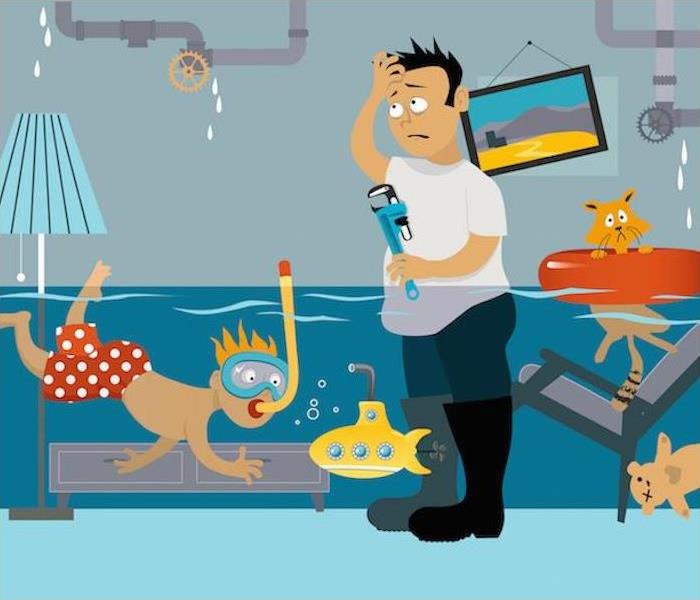How to Avoid Water Damage
7/18/2022 (Permalink)
A house’s foundation is what holds the building together and nothing weakens a home’s foundation more than water damage. It damages the core strength of the house potentially causing structural damage, mold, and mildew. Damp wood in the house attracts termites and carpenter ants that feast on the wood and attack the structural integrity of the building.
If you don’t take preventative measures with your home, it could end up costing thousands of dollars down the road. Here are three ways you help prevent water damage in your home.
Ensure Good Drainage
Poor drainage in your home can cause the foundation to get wet causing cracks, uneven settling, and giving water pathways to entering the house. You can improve the drainage to your home and keep water away from the foundation by routinely cleaning your gutters, directing your downspouts away from the house, sloping your yard away from the foundation, and keeping the soil from getting too dry.
When your gutters get clogged, the rain water slides down the side of the house damaging the siding and foundation. Cleaning out your gutters regularly so that they don’t get clogged will prevent this problem from occurring.
You should direct your downspouts five to 10 feet away from your house. If your downspouts are too close to the house or otherwise not placed in the proper location, water can build up and seep into the foundation causing water damage. You can attach an elbow at the bottom of the downspout to redirect the water the direction you want it to go.
Sloping your yard at least six inches over a 10-foot span away from your foundation will help to keep water from getting in next to the foundation. This will prevent potential hazards such as leaning walls, cracked masonry, and leaks. If you have crawl spaces, keeping any excess water away will ensure that it doesn’t pool underneath the floor. Allowing water to get in under the floor can cause problems like mold, rot, and insect infestation.
If your soil gets too dry, it can potentially cause water damage later on. When the soil around the house is dry for a long period of time, it shrinks. Then when a big rain comes, the soil expands putting pressure on the foundation walls. You can avoid this by running a soaker hose about six inches out from the foundation and three inches under the soil. This will keep it from contracting and expanding.
Test Your Sump Pump
You may not think about your sump pump very often but you will when a storm hits. To ensure that you don’t find issues with your sump pump when it’s too late, you should check the pump at least once a year. Ideally you would check the pump several times during heavy storm season.
You can test the pump by slowly filling your pump pit with water and watching for the float to rise turning on the pump. The float you’re looking for is similar to one you would find in a toilet tank. If the water level falls, your sump pump is alright. You can test your backup pump the same way but you’ll want to unplug the main pump first.
Fix Any Water Leaks
Any persistent water leaks can lead to the growth of mold, mildew, rot, or the introduction of termites and carpenter ants. These insects appear when there is moist wood as they like to chew on the soft wood. If you’re able to fix these leaks quickly, there may be no long-term damage.
Dark spots under the pipes inside sink cabinets, stains on the ceiling, toilets that rock, and drips are signs that you may have a leak. At least once a year, you should inspect your roof to check for any missing, loose, or damaged shingles that can cause your roof to leak water. Make sure to replace any cracked caulking and check for any leaks that may be around flashing.
Preventing water damage has the potential to save you thousands of dollars due to the damage water can cause to the foundation of your home. These measures can help you to prevent water damage from occurring in your home. However, no matter how much you try to avoid it, water damage still does occur. If you have suffered water damage in your home, call the professionals at SERVPRO to remedy the problem.

 24/7 Emergency Service
24/7 Emergency Service
